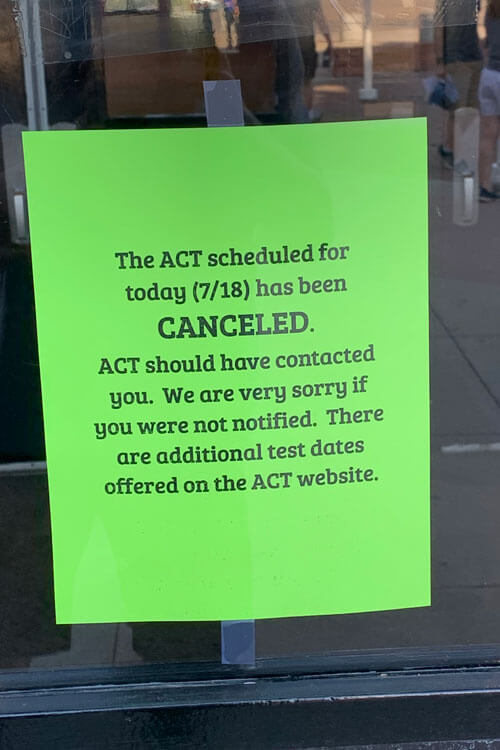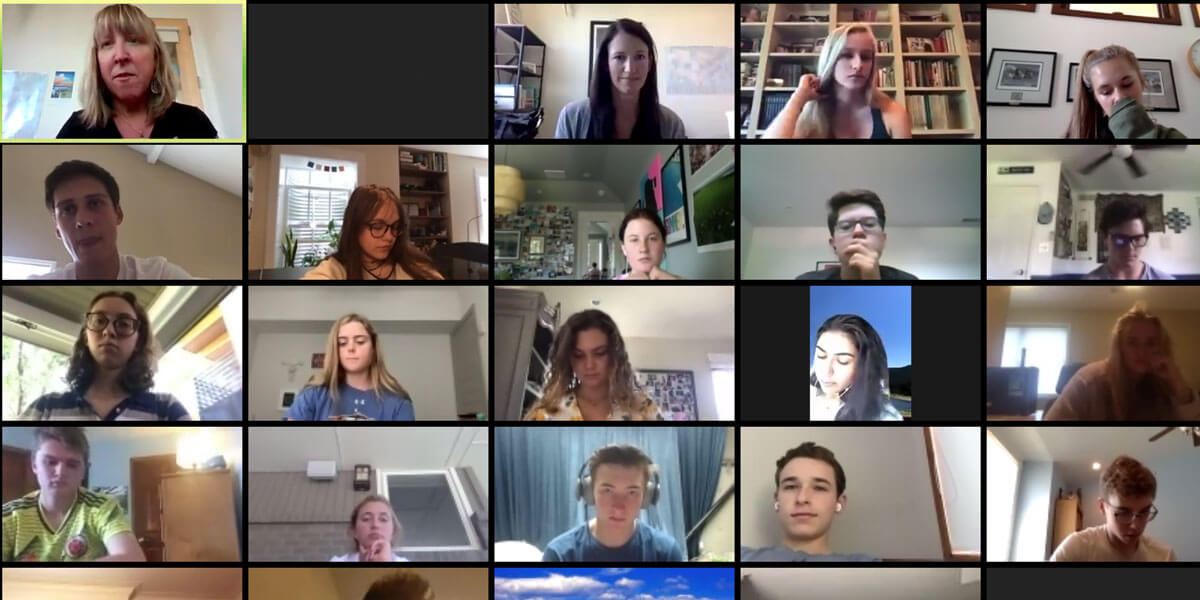Colorado Academy Seniors and parents of Seniors are familiar with the routine:
- Check email obsessively for communication from the ACT or College Board.
- Stop everything so that you are free to log into the registration system right when it opens.
- Sit at the computer for over an hour; cross your fingers.
- Fill out an encyclopedic questionnaire about your student (that you already entered the previous two times you registered for the test).
- Discover that there are no nearby spots available until October. Entertain the thought of driving all the way to Kansas or….Oklahoma.
- Come back to reality, be thankful for that October seat, and hope it doesn’t get cancelled…again.
In our senior class of 101 students, 40 students or more have not taken an SAT or an ACT, and we estimate that at least 30 students have only taken one official ACT or SAT. In a typical year, our students take one or two tests in Junior year and a final SAT or ACT in the late summer or early fall of Senior year. This year has been anything but typical. Local testing opportunities were largely cancelled in the spring and summer. The National picture is not that different from our situation in Denver: Art & Science Group’s recent study found that two-thirds of Seniors have yet to take an SAT, and three-fourths of Seniors have yet to take an ACT.
 The College Board (which administers the SAT) and ACT have responded by adding additional National Test days for Seniors this fall, but testing centers willing to host are few and far between, and we are already seeing cancellations. CA Seniors have shown up on test days to signs like the one in this featured picture. It’s a vicious cycle.
The College Board (which administers the SAT) and ACT have responded by adding additional National Test days for Seniors this fall, but testing centers willing to host are few and far between, and we are already seeing cancellations. CA Seniors have shown up on test days to signs like the one in this featured picture. It’s a vicious cycle.
Colleges and universities are well aware of the challenges students have faced trying to test, and they’ve responded by changing requirements for the Class of 2021. The “test-optional movement” that had gained significant traction in the last ten years has exploded with new colleges. Boulder to Brown, MIT to UNC. Name a school, and it is likely on this list. Most are going “test-optional” for the Class of 2021; some are beginning a pilot process over three years, with the idea that they’ll reassess their testing requirements at that point; and yet others are going to be “test-blind”—test scores not accepted—for this year or for future years. Notably, Caltech and Reed have embraced “test-blind.”
The University of California Board of Regents voted to eliminate test
scores completely for the Classes of 2023 and 2024, after which they plan
to introduce a different test. Just days ago, courts ruled that testing
opportunities have disadvantaged students so significantly that scores must
not be used at all for applicants from the Class of 2021. (This could very
well be contested in the end.) Left and right, there are calls for all colleges to seize the moment, recognize the pressure Seniors are under, and purge testing requirements altogether, at least for this year. Prioritize student well-being, once and for all, many college counselors say!
Does test-optional really mean test-optional?
Yes, yes, and yes.
Here at CA, we are swooping in to try and offer a school-day SAT and a school-day ACT for our Seniors. These are other new options that the testing companies introduced for the fall in order to widen their reach. When we decided to move forward with these tests, we approached the conversation from the students’ perspective and with equity at the forefront: if we can give all Seniors one chance and alleviate some potential stress, we should try. By the same token, we are aware that our ability to open campus, socially-distance, and offer standardized testing to our students is part of the inequity of the testing industrial complex; for every independent school that offers school-day tests, there are, of course, public schools without these means. While we are glad to be able to offer an opportunity to students in the Class of 2021, by no means do we wish to attach more importance to the SAT and ACT than they deserve. Some CA Seniors will choose not to test at all this year.
Colleges will be looking deeply at the Class of 2021 and at future classes. Looking deeper means understanding students’ motivations, evidence of their resilience, learning about their habits of mind, where they feel rooted, how the world has shaped them, imagining the student as a member of the class, getting to know them likely without the lens of a test score. Many colleges evaluate candidates “holistically” right now, looking deeper in the way I’ve described. This year, however, will force even these schools to refine what this holistic approach actually means and how it shapes their institutions. We could see the pendulum swing more widely, which is why as an independent school we must continue to focus on our students as their holistic selves, not their test scores or AP class schedules. We have a chance here, too, to revisit our Mission and see that it aligns with the work we do at CA each day.
For now, CA Seniors are in good company with peers around the country as they “visit” colleges online, attend virtual information sessions, student panels, and sample seminars, as they try so hard to imagine themselves on these campuses they’ve never touched. My colleagues and I have felt in some ways that the Class of 2021 has been doing an even better job than prior classes when it comes to researching, without the distractions of a sunny day, too much traffic, or a charming tour guide. (Some Seniors will have the chance to tour a few colleges this fall; some (not all) colleges are trying to reopen to individual or small group tours.)
But the lessons from 2020 will remain long after COVID-19 is gone. After a decade that saw the Varsity Blues admissions scandal, the prominence and continued proliferation of rankings, testing, test prep, and a lot of stressed-out students, college admissions might just change for the better. We can hope.
